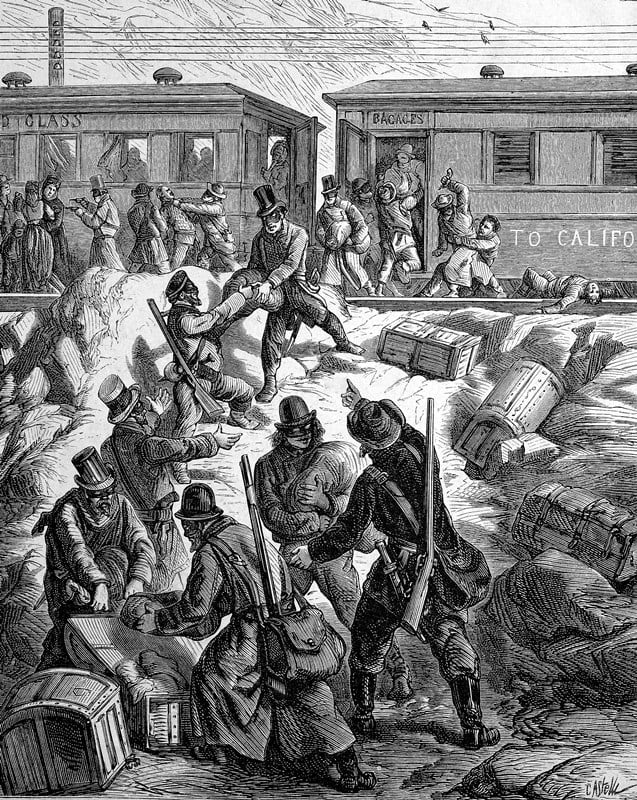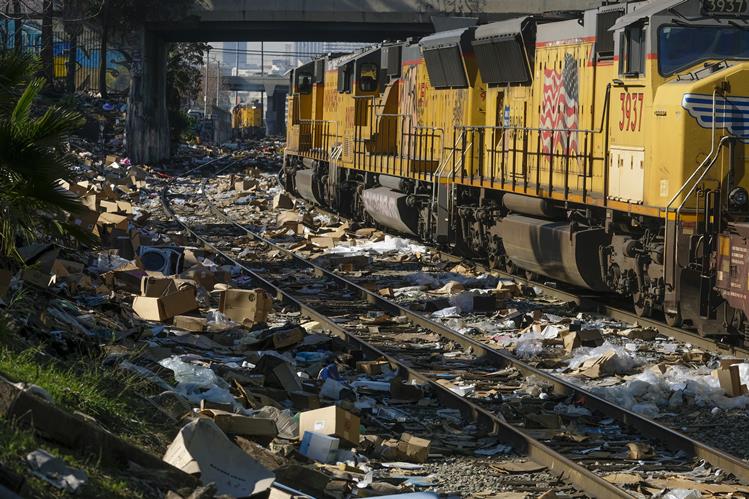Late author Michael Crichton in 1975 wrote one of his best novels, The Great Train Robbery. Set in England in the 1850s, it is a roman à clef that tells the story of an elaborate heist staged by a a group of ambitious criminals. Their target was a cache of gold on a train traveling from London to Folkestone. The thieves got away with their crime—for a while. Infighting and conscience got the better of them in the end.
As with other tales of criminal derring-do—such as Evan Lee Heyman’s 1968 novel, The Thomas Crown Affair, about an upper-crust art heist, and the 1960 film Ocean’s 11 (which could have been subtitled, “The Rat Pack Knocks Over Vegas”)—one can’t help but admire the planning and nerve that went into the job. Robbing trains is not a line of work I would want to take up. But if I ever did, I hope I could pull the thing off with even half as much panache as the gang that purloined bags of gold from a speeding railcar in 1855. That was truly a great train robbery. Bowlers off to them.
How times have changed! I know of a not-so-great train robbery in 2021. A whole string of train robberies, really, for Union Pacific freight trains crawling into rail depots in Los Angeles have been getting hit for a long time. Union Pacific has been begging for help in preventing these robberies, but apparently to no avail.
Only recently have news reports drawn attention to the scenes of the crimes: rail lines strewn with packages and broken goods yanked out of busted-open freight cars. It’s a total mess, and it’s been going on right under everyone’s noses.
Video clips making the rounds reveals the basic modus operandi of these exploits: a gaggle of local hoodlums struggling to keep their pants pulled up swarms the slow-moving cars, pries open the railcar doors with crowbars and bolt cutters, and starts hauling out whatever is inside. Sometimes it’s big-ticket electronics. Sometimes it appears to be paper towels. No gold that I can see—apart from the hoodlums’ teeth. There’s no respect for the criminal arts, either. Just low-life street punks running a smash-and-grab typical in Democrat-run inner cities, except this time the action is on trains instead of retail stores.
How hard would it be to stop these not-so-great train robberies? It ought to be a cinch. After all, the planning that went into these recent hits doesn’t quite compare with the 1855 caper. Criminals are just not what they used to be. Those who executed the awe-inspiring railway heists of yore didn’t hail just from England—the United States had its own share of great train robberies of which to boast. The Western film genre just wouldn’t be the same without masked men making acrobatic leaps from galloping horses onto accelerating cabooses. A lot of work went into those heists.
By contrast, the “organized groups of folks,” as California Governor Gavin Newsom sheepishly and apologetically called the train-robbing thieves—after mistakenly but accurately calling them “gangs”—seem to have put no effort into their robberies beyond showing up with a crowbar.
The biggest difference between the 19th-century great train robberies and the lackadaisical, slap-dash heists of our own age is not that today’s train robbers are worse at their chosen line of work. It’s that the real criminal masterminds behind them are much, much better. The “organized groups of folks” prying open Union Pacific railcar doors with their pants hanging down are not masterminds. The criminals I’m talking about are the ones at the top: our nation’s globalist elite who have normalized, excused, and even routinized crime.
Politicians in Washington have been looting our country for decades now. It seems almost natural when we hear yet another story about how a Biden or a Clinton sold out to China while working Americans paid the price. That kind of crime takes even more planning than the 1855 train robbery did. It takes coordinating media puppets, buying off bureaucrats, finagling
lobbyists, and setting a global standard for planetary larceny disguised as secular virtue.

We’re looking in the wrong place when we focus on the Union Pacific crime jobs. We ought to be looking up into the marbled offices, not down on the tracks. This is because the Confucian truism still holds true: When the rulers are rotten, the people will follow suit. If “organized groups of folks” are robbing the railroad companies and freight owners blind, then they can only congratulate themselves for imitating the ways of their criminal betters.
Image: An 1882 woodcut illustration of a California-bound train raided by masked robbers (Sunny Celeste / Alamy Stock Photo)
Of course there have always been corrupt leaders, even in Confucius’ day. One thing has changed since then, however. What we have now is corruption as a new kind of common sense and crime as a national way of life. Governors, mayors, district attorneys—to say nothing of senators and congressmen—have gotten much of the country to believe that criminality is normal and morally acceptable. As a consequence, many of us just shrug when we see railroad tracks turned into a garbage heap of discarded criminal loot.
“Guess there’s nothing that we can do,” says the typical Democrat voter. “You’re a racist for suggesting that we do anything besides help the organized groups of folks pry open the doors,” says another, and so on.
This kind of acceptance of, acquiescence in, and even admiration for crime has real consequences for the rest of us. Elsewhere in America, carjackings are skyrocketing; murders are off the charts; drug overdoses are sending whole communities into death spirals; and shopping malls are overrun with ghetto denizens whose idea of retail therapy involves breaking display cases and threatening shop clerks. The media treats all this as if it’s an exercise in social justice—which, according to the elites, it is. Anyone who speaks up risks being labeled a “domestic terrorist” by U.S. Attorney General Merrick Garland.
Back in the heyday of the Great Train Robbery, everyone knew who the bad guys were. Some may have admired the romance of those crimes, but nobody suggested that “crimes” was not the word to use to describe the actions of the bad guys. If you robbed a train and got caught, you could expect to hang for it. If you rustled a horse, you better sleep with one eye open. If you killed a man, you would find no comfort among the decent. Crime made you an outcast. Crime cut you off from the good people and the ways of honesty and hard work.
Today, we have largely lost our sense of right and wrong. Maybe we thought that appeasement was the way to make society safer. Maybe we thought that “defining deviancy down” was the high road to the New Utopia.
If we thought those things, then we were wrong. We have not gotten less crime but much, much more of it. Of much lower quality, too, as the not-so-great train robberies along the Union Pacific lines in Los Angeles demonstrate, and with a much greater degree of societal penetration.
We tried saying crime was virtue. That is where the real crime lies. The problem is not just that “groups of folks” are looting, carjacking, murdering, and running riot. The problem is that nobody in our elite-run society seems to give a damn.

Leave a Reply